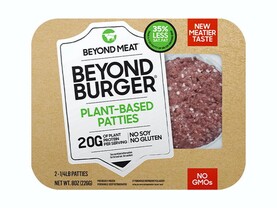One quarter of all processed vegetarian ‘meat-substitute’ products such as vegetable burgers, sausages and mince are not a source of, or are high in, protein, new research from Safefood has found.
The research also found that among those who purchase these products, one in three did so because they perceived them to be ‘healthy or better for you’.
The Safefood study looked at the nutritional content of 354 plant-based meat-substitute products on sale in supermarkets across the island of Ireland.
These products included plant-based alternatives such as mince, burgers and sausages, which are positioned in a category of foods that provide protein such as meat, poultry, eggs, fish, nuts and beans.
Consumer trends
According to industry reports, vegan is the third-fastest growing on-pack claim for food and drink launches globally over the last five years, with sales in the UK of meat-free foods forecasted to be in excess of €1bn by 2024.
Director of human health and nutrition with Safefood Dr Catherine Conlon said many of these plant-based products are simply highly processed foods.
“If you think about it, eating a sausage roll, whether that’s plant-based or meat, is still a sausage roll,” she said.
When asked about meat-substitute products, more than one in three adults (34%) said they ate plant-based versions of burgers, sausages, chicken or fish.
Of those who ate them, 41% said they consumed them once a week or more frequently, while 7% consumed them daily.
Almost eight in 10 people (79%) who eat meat-substitute products do so once a month or more often.
The top three products were meat alternative burgers (41%), mince (31%) and sausages (29%).
The top three reasons for purchasing them were that they were ‘healthy or better for you’ (33%), for taste (21%) and environmental impact (15%).
Mixed bag
Conlon highlighted that there are some positives to vegan and vegetarian products; some are lower in fat and saturated fat than their meat equivalents, while others are a source of fibre.
“As more people are increasingly choosing a plant-based meat substitute in their diet, we want to understand the reasons for this and the nutritional content of these products,” Conlon continued.
“The reality is that these are processed foods and a bit of a mixed bag. If you are going to eat them, read the label and look for products that are a good source of protein and lower in saturated fat, sugar and salt.
“There are lots of protein sources that you can choose from, including meat, poultry, eggs, beans, lentils, nuts, tofu and chickpeas.”






 This is a subscriber-only article
This is a subscriber-only article










SHARING OPTIONS: